English | Dutch |
|
| No stamp please ! | |
Limassol (Cyprus), October 29th 2015
|
|
| |
|
When we hear the sound of a rubber stamp when we go through immigration, we are stressed. We just arrived at the airport of the Turkish part of Cyprus, called Ercan Airport. A stamp in your passport of Turkish Republic of Northern Cyprus is not what we want. At least that's what everybody says. Cyprus is to this day still split into two halves; a Greek part and a Turkish part, which are strictly separated by a buffer zone which is monitored by the UN. The Greek Cypriots view the Turkish part of the island as occupied territory. And the Greek Cypriots are not happy when you arrive in Cyprus via the Turkish part. They see it as an illegal way of entering the country. And a stamp in the passport is a proof of this illegal activity, and could result in serious problems when you want to cross to the Greek part of Cyprus. At least that is the people told us. But what can we do. The lady of the immigration just put the stamp in our passport. It’s there to stay. We tell the Turkish Cypriot immigration officer about the potential problem we have, be she assures us that there is nothing to worry about. Let’s hope so. We take the bus from the airport to Lefkoşa, the capital of both the Turkish and Greek Cypriots. This town, which the Greek Cypriots call Nicosia, is also split into two parts. We have booked a hotel in the Greek part of the capital and walk from the bus station in the Turkish part of town to the border between the two parts of Cyprus. As most other borders in the world, we have to show our passport at both sides of the border. Between the two immigration offices is a small piece of no man's land where the buildings are boarded up. The border formalities went smoothly and ten minutes later we are in the Greek part of Cyprus, which is part of the European Union. The relationship between the Turkish and Greek Cypriots is improving steadily and now all residents of both parts of Cyprus can visit to other part of the island without problems. The same is true for tourists. This improvement in relations has also led to the fact that the Greek Cypriots are no longer panicked when they notice that travellers have entered Cyprus in the Turkish part of the island. Hence, we therefore have no problems at the border. |
|
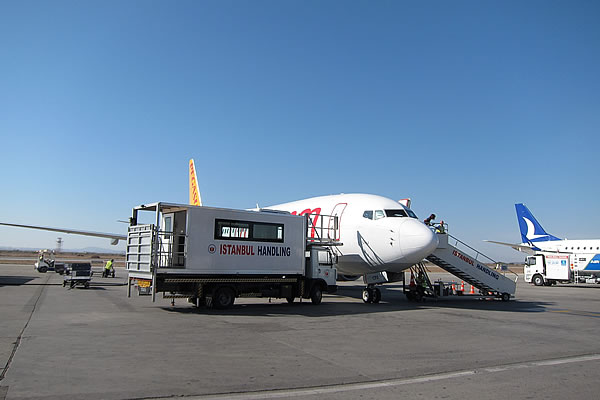 |
|
Arrival in the unrecognised Turkish Republic of Northern Cyprus |
|
When we enter the Greek part of Nicosia, we initially do not feel that we are in Cyprus. Everywhere we see men from the Indian subcontinent and women from Southeast Asia walking the streets and sitting in the parks. And we're not talking about hundreds, but thousands of Asians. The men generally come from Sri Lanka, and the women from the Philippines. It soon turns out that the immigrants are brought into the country on temporary contracts. The Filipinas are working as housekeepers in Cypriot families, while the Sri Lankan men work on the fields. However, today is Sunday, the only day in the week that the immigrants have a day off and massively go to the city centre of Nicosia to meet each other. We wonder how a country like Cyprus, who had to be helped a few years ago by the rest of Europe, to prevent going bankrupt, can pay this huge mass of immigrants. Cyprus has a considerable army of the unemployed people (15% as per September 2015), but still decides to outsource part of the work in Cyprus to immigrants who are brought in on temporary contracts from Asia. For the Filipino women, Cyprus is the tenth leading immigration country, after Singapore, Hong Kong and the countries of the Arabian Gulf. In addition, research has shown that the Cypriot economy does not really need the women from the Philippines. It is not so, that the Filipinas fill in the gaps in the households that arise because the Cypriot women work that much. Cypriot women love a lot of free time and having a foreign housekeeper is pure luxury. We were wondering how a Cypriot family can afford it having a full time housekeeper. The answer is simple. Immigrants are cheap in Cyprus; dirt cheap. The Cypriot law states that the minimum wage does not apply to immigrants. Many immigrants are only paid about 300 Euro per month, in addition to room and board. And for that little money, many Cypriot women prefer to outsource the housekeeping activities. | |
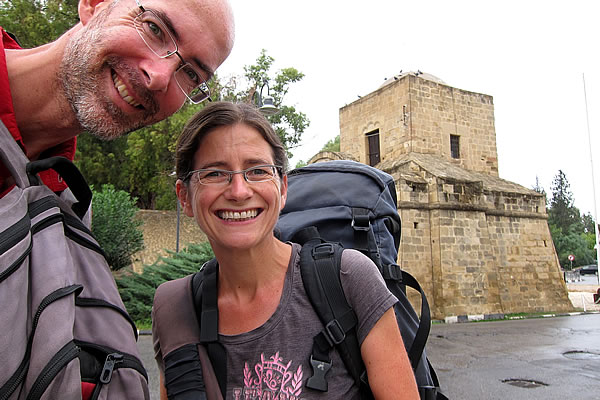 |
|
At the Girne Gate in Lefkosa |
|
What we also notice is that the younger generations of Greek Cypriots love the ‘jet set’ culture. That does not necessarily mean that they are rich, but more that they love the 'jet set’ style. Nice clothes, shiny cars, glitzy cell phones, large sunglasses, lots of makeup, and hours and hours of coffee drinking on hip and expensive terraces is what these generations seem to keep busy. Eleni, the owner of the small hotel where we have booked a room, also belongs to this generation. When we arrive at the hotel, she is not there. Luckily we have her phone number. Ten minutes after we called her, she arrives in her shiny BMW. She definitely is in her 40s, but still dresses like an 18-year-old model. She uses a lot of makeup, wears bright red nail polish, has huge sunglasses on her head, and a thin cigarette clamped between her finders. 'Victoria Beckham' is what we think. We check in and when we walk to our room she says that she will not be around that often. "Call me if you need anything, and if you check out, you can throw the key in the mailbox”. And gone she is. |
|
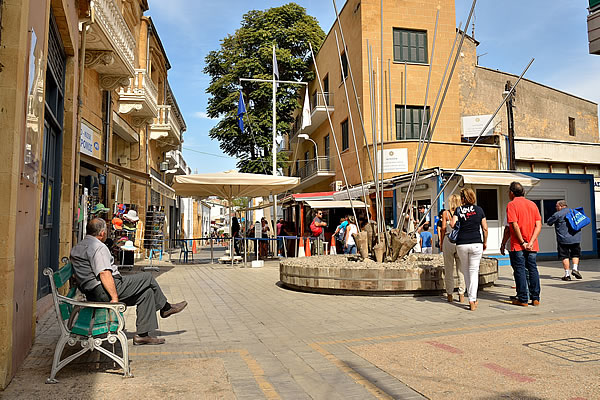 |
|
The Greek side of the central border crossing in the heart of Nicosia/Lefkosa |
|
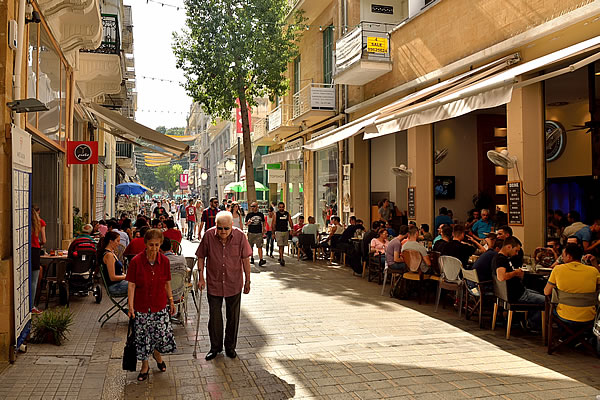 |
|
Ledra Street, the main shopping street in Greek-Cypriotic Nicosia |
|
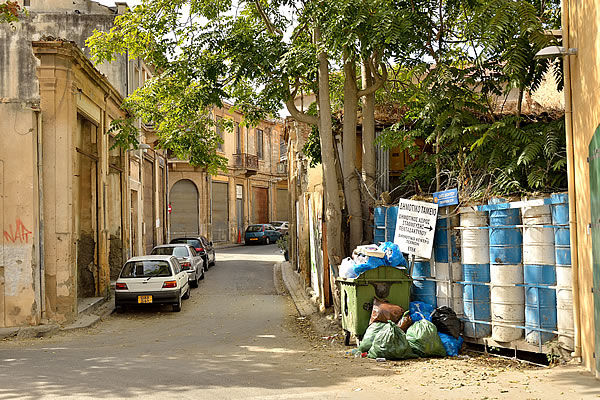 |
|
One of the many barricades in town that seperates the two parts of the city |
|
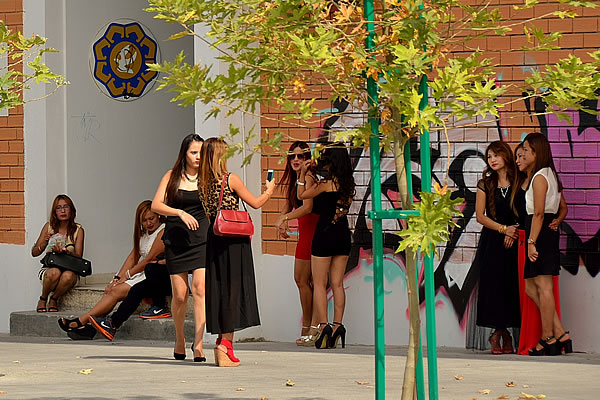 |
|
Filipina women enjoying their free Sunday in Nicosia |
|
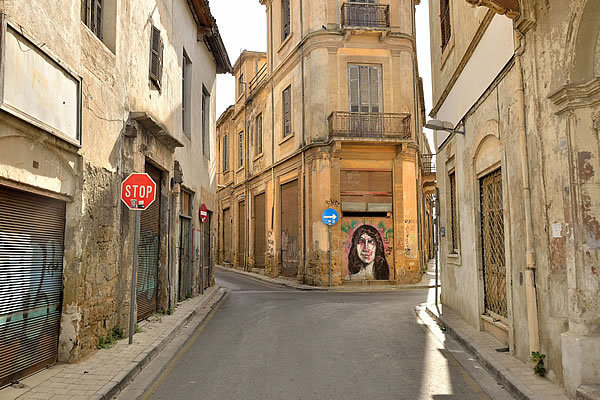 |
|
Ghost part of Nicosia, close to the border zone |
|